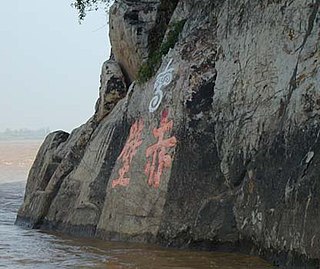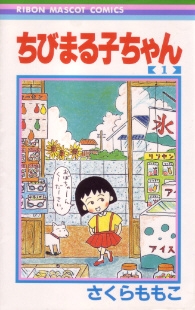Chibi most often refers to:
Contents
- Chibi (style), a super-deformed diminutive style of Japanese-influenced caricature
- Chibi, Hubei (赤壁 lit. Red Cliff), a county-level city in southeastern Hubei, China.
Chibi may also refer to:
Chibi most often refers to:
Chibi may also refer to:
Yu or YU may refer to:
Jin refer to:
Ren or REN may refer to:
Red Cliff or Red Cliffs may refer to:

The Battle of Red Cliffs, also known as the Battle of Chibi, was a decisive naval battle in the winter of AD 208–209 at the end of the Han dynasty, about twelve years prior to the beginning of the Three Kingdoms period in Chinese history. The battle was fought between the allied forces of the southern warlords Sun Quan, Liu Bei, and Liu Qi against the numerically-superior forces of the northern warlord Cao Cao. Liu Bei and Sun Quan frustrated Cao Cao's effort to conquer the land south of the Yangtze River and reunite the territory of the Eastern Han dynasty.
An aria is a self-contained expressive melody for one voice usually with orchestral accompaniment.

Chibi Maruko-chan is a manga series written and illustrated by Momoko Sakura. The series depicts the simple, everyday life of Momoko Sakura, a young girl everyone calls Maruko, and her family in suburban Japan in the year 1974. Maruko is a troublemaker, and every episode recounts Maruko's trouble and how she and her friends succeed in solving the situation. The series is set in the former of Irie District (入江町), Shimizu, now part of Shizuoka City, birthplace of its author.
Kurenai may refer to the following:
Anju may refer to:
Banzai may refer to:

Xianning is a prefecture-level city in southeastern Hubei province, People's Republic of China, bordering Jiangxi to the southeast and Hunan to the southwest. It is known as the "City of Osmanthus".

Red Cliff or Chibi is a 2008–2009 internationally co-produced epic war film, based on the Battle of Red Cliffs and the events at the end of the Han dynasty and immediately prior to the Three Kingdoms period in Imperial China. The film was directed by John Woo, and stars Tony Leung, Takeshi Kaneshiro, Zhang Fengyi, Chang Chen, Zhao Wei, Hu Jun, and Lin Chi-ling. It is Woo's first major film since 2003's Paycheck and his first Chinese-language feature since 1992's Hard Boiled, also starring Leung.

Chibi is a county-level city in southeastern Hubei province, China. Neighboring Wuhan in the north and Yueyang in the south, Chibi is called the "South Gate of Hubei". It is under the administration of Xianning prefecture-level city. Chibi was called Puqi until 11 June 1998, when the State Council approved its renaming to "Chibi" since it was the site of the famous Battle of Chibi that took place in the winter of 208/9 CE.
Karin may refer to:

Sakura is a common feminine Japanese given name which can also be used as a surname.
Mei is a feminine given name used in various cultures, particularly Japan and China.

"Kuon no Kawa" is the ninth Japanese single released by alan. The song is the theme song of the movie Red Cliff , released in Japan on April 10, 2009.
Red Cliff is a Peking opera by the China NCPA which premiered at the first anniversary of the National Grand Theatre in 2008. The director was the choreographer and PLA lieutenant general Zhang Jigang, best known as deputy chief director of the Beijing Olympic Games opening and closing ceremonies. It was written by Cai Fuchao and composed by Zhu Shaoyu.
Alita is a feminine given name used primarily in English and Spanish. It is a short form of Adalita, which is derivation from the Old High German "Adalhaidis”, from the Proto-Germanic words *aþala-, meaning "noble" and *haidu-, meaning "appearance; kind", hence meaning "elite" or "nobility".